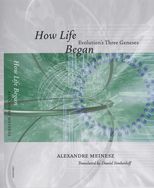 How Life Began: Evolution's Three Geneses
How Life Began: Evolution's Three Geneses
Contents
-
-
-
-
-
-
-
-
-
-
-
First Step: Becoming Sedentary First Step: Becoming Sedentary
-
Second Step: Initiation of Social Life Second Step: Initiation of Social Life
-
The Genesis of Multicellularity The Genesis of Multicellularity
-
Division of Labor in a Society of Ancestral Cells Division of Labor in a Society of Ancestral Cells
-
Development of the Embryo: Retracing Ancestral Evolution? Development of the Embryo: Retracing Ancestral Evolution?
-
Architectural Blueprints Endlessly Tested and Refined: Life Becomes Complex Architectural Blueprints Endlessly Tested and Refined: Life Becomes Complex
-
Multicellularity: An Innovation Common to Many Groups of Organisms Multicellularity: An Innovation Common to Many Groups of Organisms
-
Multicellularity: A Product of Convergent Evolution? Multicellularity: A Product of Convergent Evolution?
-
The Innovation of Multicellularity: Result of Shared Software? The Innovation of Multicellularity: Result of Shared Software?
-
The Program “Unity Is Strength” The Program “Unity Is Strength”
-
Architectural Blueprints and Division of Labor: The Third Genesis of Life Architectural Blueprints and Division of Labor: The Third Genesis of Life
-
-
-
-
-
-
7 The Lego Game: The Genesis of Visible Life
Get access-
Published:September 2008
Cite
Abstract
The passage from microbial unicellular animal and plant life to multicellular life is easy to imagine; it seems so evident that is not discussed in most evolution books. Nevertheless, it required a series of major innovations, all of which had to be acquired by multicellular organisms. This chapter first presents the environmental causes that oriented life towards complexity, towards multicellularity. Then it describes the various stages of cellular association that led to the emergence of multicellularity, and emphasizes that they were not all predetermined, and there is no tendency towards complexity of life. Finally, the chapter considers the very strange parallelism of multicellularity: the fact that diverse, independent lineages of life all adopted multicellular structure and specialization of cells. Is this coincidence a simple convergence of adaptation to a shared lifestyle? Or does it derive from a shared genetic basis that drives evolution in this direction?
Sign in
Personal account
- Sign in with email/username & password
- Get email alerts
- Save searches
- Purchase content
- Activate your purchase/trial code
- Add your ORCID iD
Purchase
Our books are available by subscription or purchase to libraries and institutions.
Purchasing information| Month: | Total Views: |
|---|---|
| November 2022 | 1 |
| July 2023 | 2 |
| August 2024 | 2 |



Get help with access
Institutional access
Access to content on Oxford Academic is often provided through institutional subscriptions and purchases. If you are a member of an institution with an active account, you may be able to access content in one of the following ways:
IP based access
Typically, access is provided across an institutional network to a range of IP addresses. This authentication occurs automatically, and it is not possible to sign out of an IP authenticated account.
Sign in through your institution
Choose this option to get remote access when outside your institution. Shibboleth/Open Athens technology is used to provide single sign-on between your institution’s website and Oxford Academic.
If your institution is not listed or you cannot sign in to your institution’s website, please contact your librarian or administrator.
Sign in with a library card
Enter your library card number to sign in. If you cannot sign in, please contact your librarian.
Society Members
Society member access to a journal is achieved in one of the following ways:
Sign in through society site
Many societies offer single sign-on between the society website and Oxford Academic. If you see ‘Sign in through society site’ in the sign in pane within a journal:
If you do not have a society account or have forgotten your username or password, please contact your society.
Sign in using a personal account
Some societies use Oxford Academic personal accounts to provide access to their members. See below.
Personal account
A personal account can be used to get email alerts, save searches, purchase content, and activate subscriptions.
Some societies use Oxford Academic personal accounts to provide access to their members.
Viewing your signed in accounts
Click the account icon in the top right to:
Signed in but can't access content
Oxford Academic is home to a wide variety of products. The institutional subscription may not cover the content that you are trying to access. If you believe you should have access to that content, please contact your librarian.
Institutional account management
For librarians and administrators, your personal account also provides access to institutional account management. Here you will find options to view and activate subscriptions, manage institutional settings and access options, access usage statistics, and more.